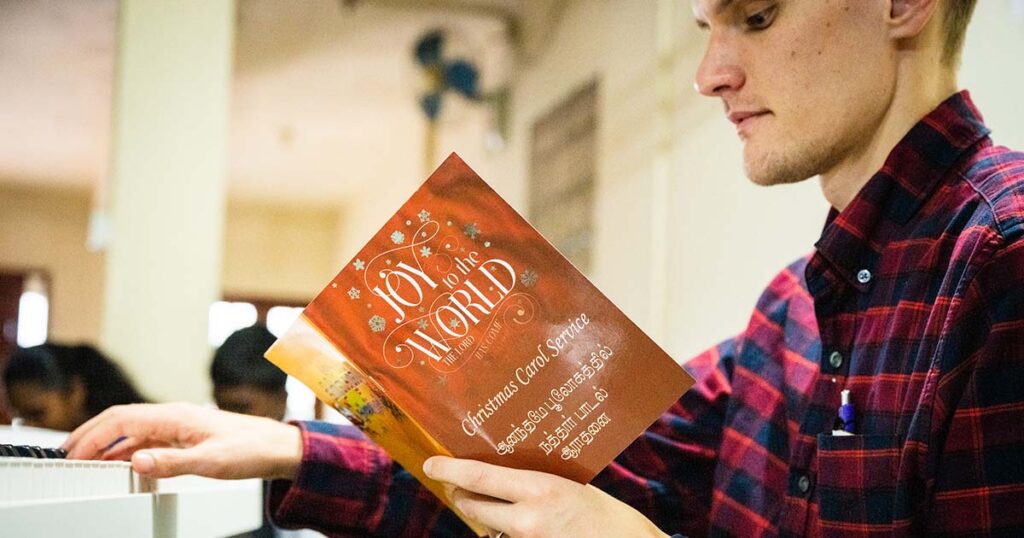Martin Luther never sang “Joy to the World.” Isaac Watts wrote that hymn 200 years after Luther composed his own song of joy and thanksgiving for God’s coming to earth as Jesus of Nazareth. Luther’s hymn “From Heaven Above to Earth I Come” (LSB 358) explodes with his delight and gratitude that God took on human flesh and blood. Its simple recital of the Christmas story revels in the birth of the Virgin Mary’s child, who is the second person of the Holy Trinity. The glad tidings of this child’s appearance in Bethlehem is, Luther confessed, “the joy of all the earth” — the original German says that this “joy and glee” is “yours.”
This hymn was not Luther’s first hymn celebrating the incarnation of the Messiah. In 1524, the reformer had published three others: “We Praise, O Christ, Your Holy Name” (in English, “We Praise You, Jesus, at Your Birth [LSB 382]), “Savior of the Nations, Come” (LSB 332), his rendering into German of the fourth century hymn of Anselm, and “From East to West, from Shore to Shore” (LSB 385), a German translation of the fifth century work of Coelius Sedulius.
Luther reflects on Christmas past
About a decade later, as his family grew, Luther reflected on the celebration of Christmas in his childhood in Eisleben, County of Mansfeld. In medieval German practice for this festival day, children gathered around a manger scene constructed before the altar of the church. The Christmas story was then re-enacted for them by adults playing the roles of Mary and Joseph, shepherds, innkeeper and wisemen. The recitation of the biblical account elicited in the children a sense of excitement about God’s intervention in human history as Savior. They expressed their elation with a song of response and with a dance — echoed by the adult Luther in the line, “My heart for very joy now leaps.” He structured “From Heaven Above” in the form of the angel’s proclamation of the Savior’s birth and the children’s response that brings the 14th verse to its conclusion, giving glory to God for His Son and repeating the angels’ joyous wish for a glad new year.
Luther’s portrayal of the events in Bethlehem in this hymn narrates Luke’s report in the context of the believers’ laud and thanks, but “From Heaven Above” is more than just a praise song. It reflects the reformer’s rich theological exposition of what the Savior’s birth means in the very concrete terms of a newborn baby. He may have been, as the German text confesses, “the one who upholds and carries the entire world” and “the Creator of all things,” but he lay there in the trough of the innkeeper with just plain old diapers; His bed consisted of the grass on which the cattle and donkeys were feeding. The reformer’s confident faith that the Word of God had become flesh furthered his conviction that the Creator of the universe was not ashamed to descend into the muck and mud of Mary and Joseph’s daily grind.
Luther’s Christmas sermons reflect this same delight in the total immersion in humanity that the second person of the Holy Trinity experienced, and in his lectures on Galatians, he urged his students to avoid trying to mount up to heaven to look around for God. They should rather find Him in the crib in Bethlehem, in Mary’s womb, at His mother’s breasts (LW 26:29). The birth of a baby is an occasion for joy. Luther knew from personal experience that a newborn hunk of flesh and blood can also produce anxiety and doubt about a parent’s ability to care for a child. He could imagine the challenges Mary and Joseph faced trying to change diapers on a mattress of hay and grass. Yet his parental sense of awe and wonder at his own newborn children heightened his sense of the joy and excitement Jesus’s parents must have felt as the shepherds poured out their excitement in their report of the angels’ proclamation of joy for the world.
Joy in the One who comes ‘From Above’
At the same time, Luther exulted in the fact that God Himself had come to rescue His people from their sin. “From Heaven Above” makes clear that this tender child, in Luther’s German text, is God come in human form and flesh. Our Messiah came to lead us out of all misery. His desire to save us has cleansed us from all sins. He has brought the salvation that will lead all His people into life in heaven. He was not ashamed to join us sinners in our misery and to lie in hay and diapers instead of satin and silk.
This Savior enters into the hearts of His people and dwells with us, forgiving sins and leading us to walk in His footsteps. Against the background of his childhood experiences of the Christmas reenactment of the Lord’s birth, Luther made it clear that Christ and His salvation came down to us. This message countered much of what Luther learned even as a child about his having to raise himself up to God with faithful attendance at mass and other good works, so that he could be worthy of finding a place in God’s eternal kingdom. His efforts to “go up the down staircase” drowned out to some extent the wonder of his childhood on the holy evening of December 24. But that wonder asserted itself as Luther was turning 50 in 1533 or in 1534 when he sat down to write this hymn. With memories of Mansfeld’s manger scene in mind, he turned again in awe to give God honor and praise in His exalted throne for sending His Son, a gift that caused the angels to rejoice “in pious mirth.”
Probably a decade later, Luther prepared a shorter summary of the Christmas story, “From Heaven Came the Angels,” with the angelic hosts as the narrators of the announcement to the shepherds of the birth of the baby in Bethlehem as prophesied by Micah. This hymn also expressed the overwhelming joy that Luther felt because the birth of Jesus brought liberation from sin and the devil for His people. As the angels had said, the Savior had come, ensuring life eternal for His people.
Luther’s life of song
Luther loved to sing, and he loved the reports of Jesus’s birth by the evangelists Matthew and Luke. He set his confession of the incarnation of the Savior of the world to his own tune in the case of “From Heaven Above,” and to an adaptation of a 15th century tune for “From Heaven Came the Angels.” He knew that God likes to sing faith in Himself into His people’s hearts. This confession of the newborn Messiah conveyed the core of biblical accounts of the incarnation to his children and over the centuries to others around the world.
The reformer’s confession of his faith points his church today to the saving work of this baby born in Bethlehem, in diapers and suckling, who as God in human flesh died and rose to end Satan’s rule and sin’s crushing burden to the delight and joy of those who trust in Him.
Photo: LCMS Communications/Erik M. Lunsford




